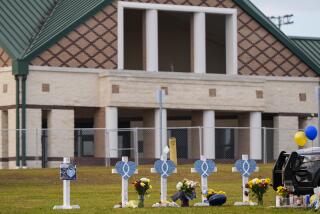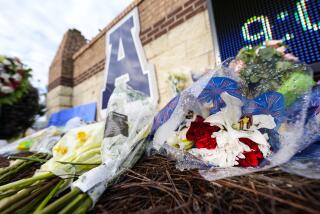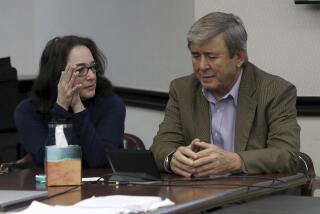How Can We Tell Which Teen Will Kill? We Canât
Almost two years ago, after the Columbine shootings, I wrote an op-ed for this newspaper titled âDonât Blame the Parents.â I explained that parents often are wrongly blamed when something goes seriously amiss in a childâs life. When a kid brings a gun to school and fires it, and people die, the grieving parents of the shooter are subjected to intense scrutiny. What did they do wrong?
The belief that the parents of the shooter must have done something wrong serves as reassurance for other parents. âIâm raising my kid right,â they tell themselves. âMy kid would never do such a thing.â
Unfortunately, there is a limit to what good parenting can do. Modern children lead two almost independent lives: their lives at home with their parents and siblings and their lives outside the home, where the most important people are their peers. No amount of parental love can keep a kid from being miserable if his peers pick on him or reject him.
Most school shooters are kids who were picked on or rejected by their peers. They have been badly hurt and made to feel puny and powerless. They want to get even and they want to feel powerful. Guns in their hands makes them feel powerful.
Though many school shooters tell others about their plans, I havenât heard of any who warned their parents. The parents of the Columbine shooters, for example, said they had no idea what their sons were planning. Teenage boys often act mysterious, and many like to play with explosives. Even kids who actually make threats donât usually mean them. We couldnât possibly lock up every kid who talks about killing someone. Only a tiny minority of them will ever carry out their threats.
How can we tell who will and who wonât? The short answer is: We canât. We will never be able to predict human behavior perfectly, because itâs too complex and chance plays too big a role. School shootings occur when a number of relatively common predisposing factors all come together to produce an extremely unlikely outcome. Itâs the fact that theyâre so unlikely--so rare--that make school shootings so hard to predict and therefore to prevent.
I donât mean to suggest, however, that there is nothing parents can do. Parents should be alert to signs that things are not going well in their kidâs life outside the home. The problem is that kids donât like to tell their parents if theyâre having problems with their peers--they tend to keep their two lives separate. But parents can keep their eyes open for unexplained bruises, âlostâ garments or sports equipment, reluctance to go to school, signs of anger or depression. If they find reason to worry, they should convey their fears to a school psychologist or guidance counselor.
But some kids donât give clues. Thus, the most important thing parents can do to prevent school shootings is to make sure their kid doesnât have easy access to a gun. Most of the shootings wouldnât have happened if the perpetrator hadnât known where he could get his hands on a gun on a momentâs impulse.
In a survey of American households reported in the 1999 Archives of Pediatrics, one-third of the respondents said they had a gun in the house; 21% admitted that they kept it loaded and in an unlocked place. A gun was kept loaded and unlocked in 11% of the households with children.
Even a locked cabinet is not much of a barrier to a determined adolescent. You might think, âMy kid would never do such a thing,â but you might be wrong. The false sense of safety that comes with gun ownership is not worth the risk that some day it might be your kid in the news, your kid taking out his frustration and anger on his classmates.


